Leaving Christchurch
At 4:45 in the morning, a shuttle brought me and my research team back to the Clothing Distribution Center in Christchurch. After arranging our bags, we checked into the United States Antarctic Program Passenger Terminal.
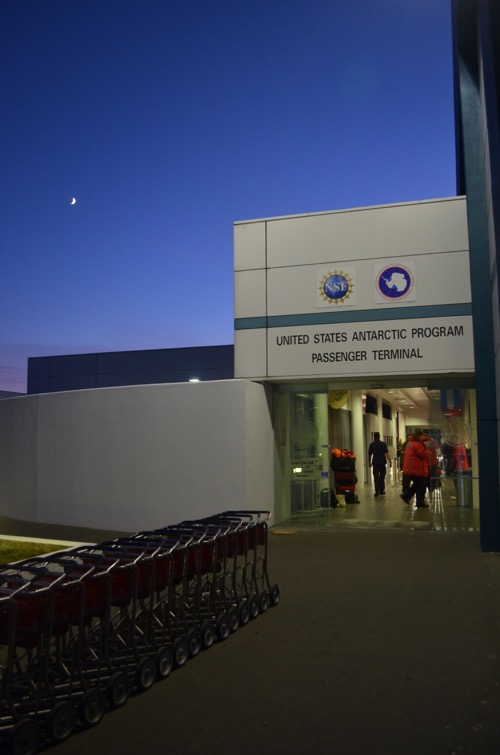 United States Antarctic Program scientists and staff arrive at the passenger terminal in the early morning to board a plane to McMurdo Station.
United States Antarctic Program scientists and staff arrive at the passenger terminal in the early morning to board a plane to McMurdo Station.
After watching videos about safety, protocols and what to expect in Antarctica, we had a moment to look at exhibits in the Antarctic Centre and eat breakfast.
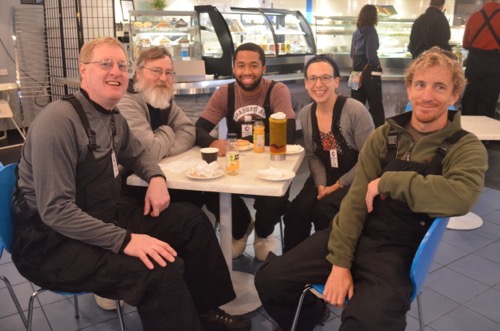 From left to right, Andrew Klein, Steve Sweet, Carl Green, Michelle Brown and Terry Palmer enjoy breakfast before flying to McMurdo Station.
From left to right, Andrew Klein, Steve Sweet, Carl Green, Michelle Brown and Terry Palmer enjoy breakfast before flying to McMurdo Station.
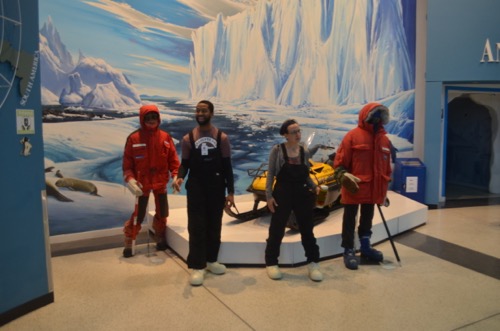 Carl Green and Michelle Brown blend into an exhibit at the Antarctic Centre while waiting to depart Christchurch.
Carl Green and Michelle Brown blend into an exhibit at the Antarctic Centre while waiting to depart Christchurch.
It Takes a Village
So much goes into making the United States Antarctica Program (USAP) run smoothly. There are many people behind the scenes who make our trip much more enjoyable. One person who plays a key role in the happiness of staff and scientists as they head to the ice is Valery Ryder.
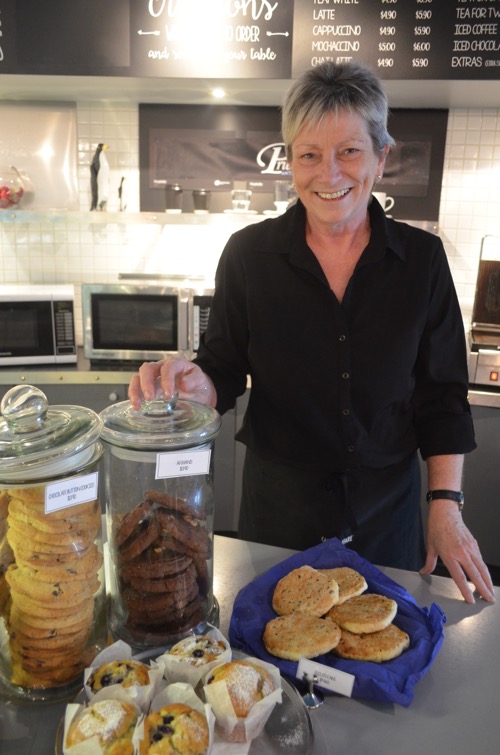 Valery Ryder greets groggy passengers with a smile as they get breakfast at Priestly's Café in the Antarctic Centre.
Valery Ryder greets groggy passengers with a smile as they get breakfast at Priestly's Café in the Antarctic Centre.
Valery makes sure Priestley's Cafe in the Antarctic Centre is open so that we can enjoy breakfast and a much-needed coffee before we get on the cargo plane. This is no easy task. Like those of us who travel down to Antarctica, Valery needs to wake up in the early morning to check if the flight is still scheduled. It is common for flights to get cancelled, but we don't know until the day of the flight. If the flight is still scheduled, Valery comes in ahead of us to prepare. If it is cancelled, she hopefully can fall back to sleep. Grumbling about early mornings and last minute cancellations is ordinary among those heading to Antarctica, but for Valery it is part of the job. She says she is happy to get up early so that we can get a good breakfast. Thank you Valery!
Not Your Ordinary Plane
After breakfast, a bus transported us to the airplane, a large C-17 cargo plane that overwhelms the Tarmac.
 Passengers board the C-17 Globemaster III Cargo Plane.
Passengers board the C-17 Globemaster III Cargo Plane.
Walking onto the cargo plane is a strange experience. The inside of the plane is gutted to fit large cargo pallets. Passengers and their coats line the walls of the plane, creating a blanket of red along the perimeter. Once the engines start up, the roar is so loud that everybody wears ear plugs to muffle the din.
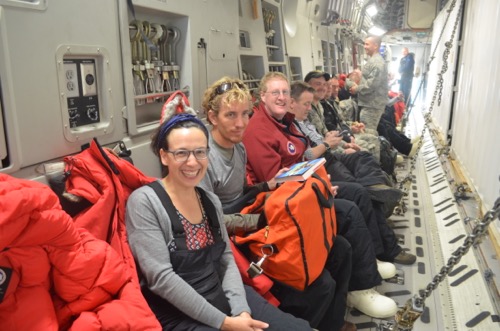 Michelle Brown, Terry Palmer and Andrew Klein settle in for the five hour flight to Antarctica on the C17 Cargo plane.
Michelle Brown, Terry Palmer and Andrew Klein settle in for the five hour flight to Antarctica on the C17 Cargo plane.
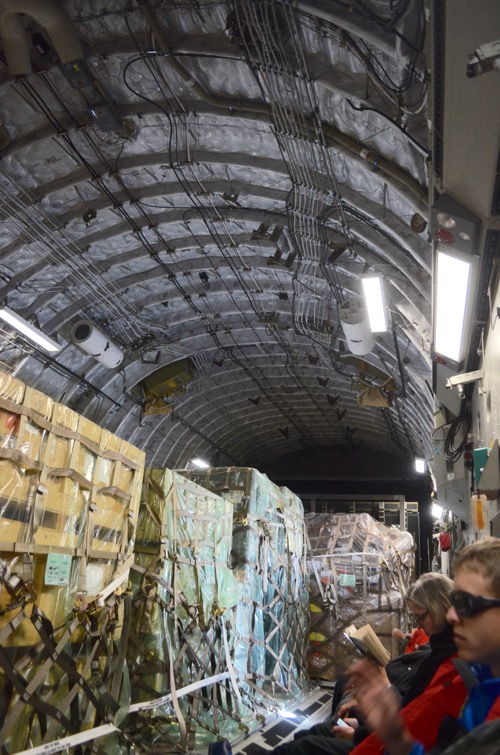 The C17 Globemaster Cargo Plane is gutted to allow for large pallets of scientific equipment.
The C17 Globemaster Cargo Plane is gutted to allow for large pallets of scientific equipment.
As I write this journal, I sit facing a large shipping container, called a MILVAN, which is chained to the base of the floor. We are flying over the rough waters of the Southern Ocean and will soon be landing on Pegasus, the ice runway outside of McMurdo Station. It is impossible not to feel a sense of adventure, which I imagine so many past explorers felt as they neared the coast after months at sea.
Critical Thinking
Gravity plays a key role on the cargo plane. We are each weighed in along with our bags and all the cargo is carefully weighed, recorded and calculated. I noticed that the center of gravity is marked on the plane. What is the "center of gravity"? Why do you think the center of gravity is recorded on the plane--how does it affect a plane's movement?
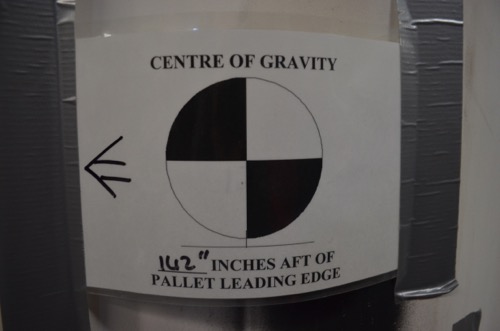 The center of gravity is marked on the cargo plane.
The center of gravity is marked on the cargo plane.
Ice POD
Today's Ice POD compares an efficient engineering system to cool hot air on the C-17 plane with penguins' adaptations to keep their feet warm.
You can download the PowerPoint Slide here: 4_icepod.pptx
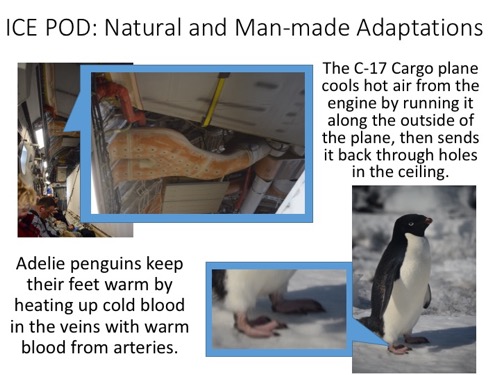 Ice Picture of the Day compares heating air in the cargo plane with heating blood in the feet of Penguin.
Ice Picture of the Day compares heating air in the cargo plane with heating blood in the feet of Penguin.
Comments